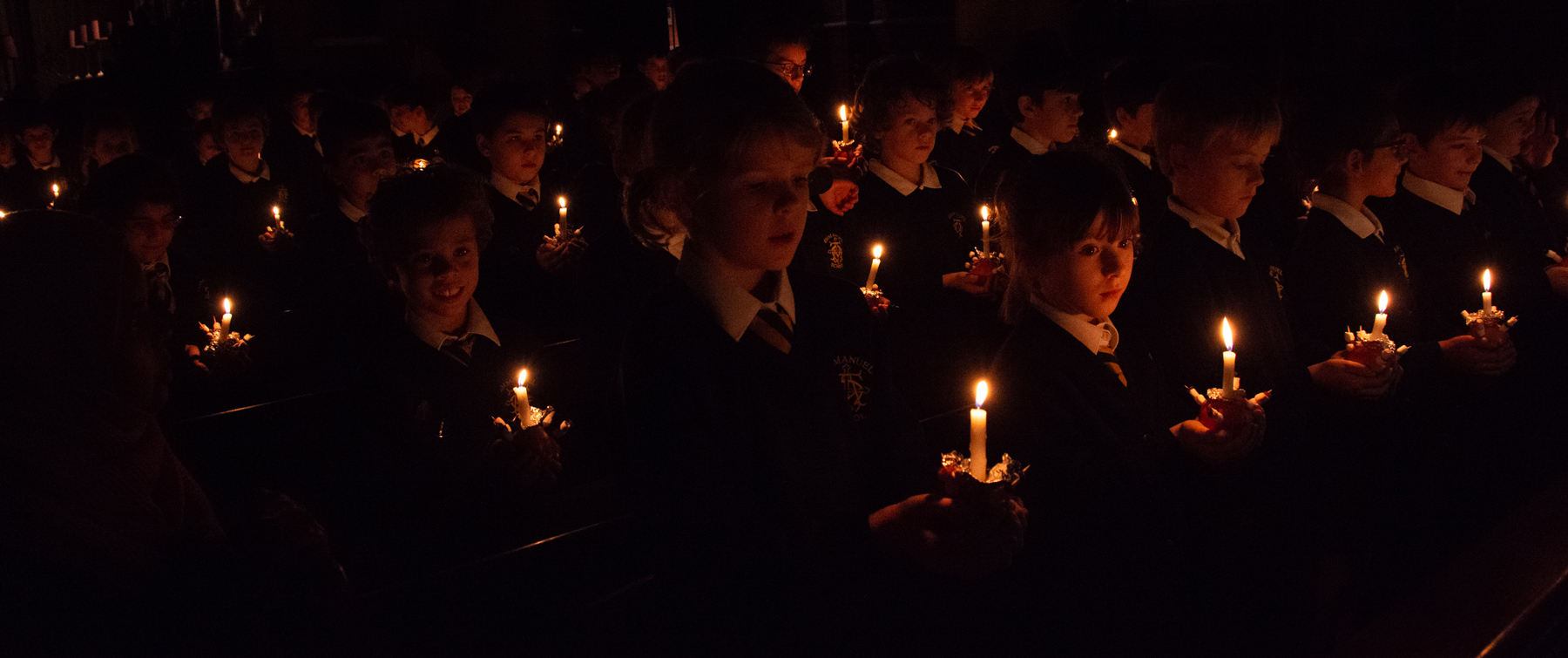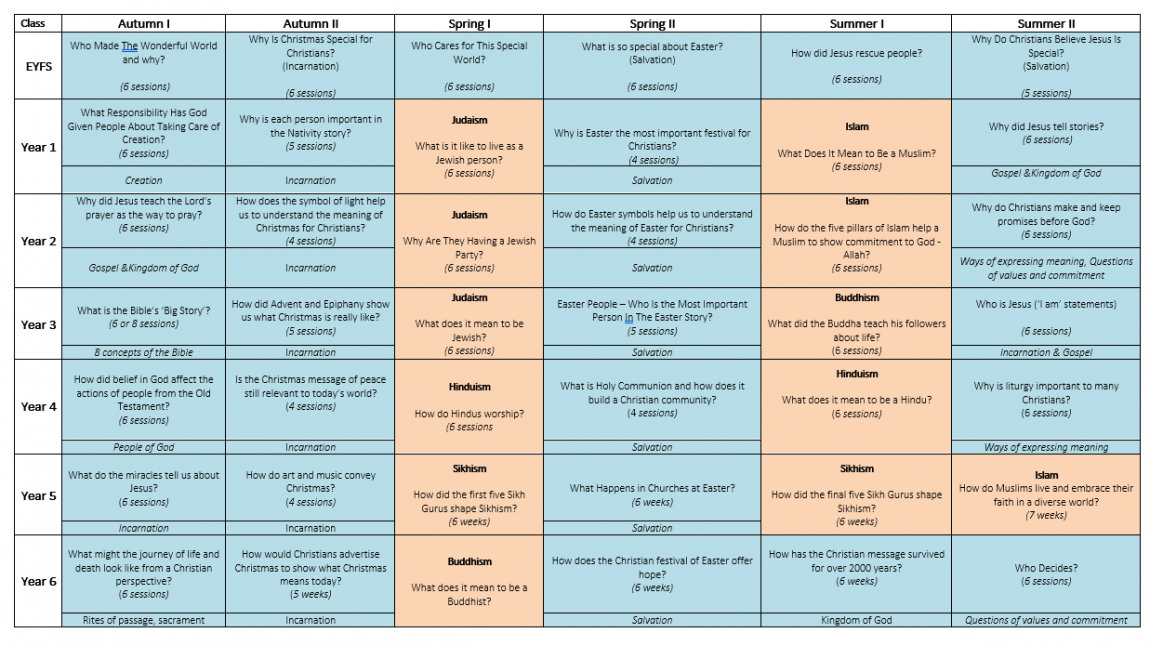Religious Education

RE statement of intent:
At Emmanuel, Religious Education is a key component of our broad and balanced curriculum as we aspire for all children to experience ‘life in all its fullness’. We intend for our RE curriculum to:
- Support and challenge pupils to reflect upon, develop and affirm their own beliefs, values and attitudes, and those of others, through an exploration of shared human experience.
- Develop children’s knowledge, skills and understanding of the diverse nature of our school community, local community and the wider world.
- Develop pupil understanding of the place and significance of religion in the contemporary world.
Introduction to RE
At Emmanuel, the teaching of RE is central to our curriculum and it has an equal status to the core subjects. Pupils at Emmanuel receive a balanced RE curriculum, which enables learners to acquire a thorough knowledge and understanding of the Christian faith, as well as other world religions including Judaism, Hinduism, Islam, Buddhism and Sikhism.
The London Diocesan Board of Schools curriculum provides a systematic approach to the teaching of RE and for all faiths, it is taught through six key areas of enquiry:
- Beliefs, teachings, sources of wisdom and authority
- Ways of living
- Ways of expressing meaning
- Questions of identity, diversity and belonging
- Questions of meaning, purpose and truth
- Questions of values and commitments
Within every unit of learning the following steps take place as part of the learning process:
Enquire: Engage with a big question and subsidiary questions. All questions will be rooted in one of the disciplines of RE: Theology, philosophy or human/social science
Investigate/explore: What is the religious content and context being explored? How deep can we go? This ‘explore’ stage of the enquiry is where children will be primarily learning about religion and belief. In order for this to be effective there are some strategies that can be used to ‘deepen’ learning:
- Interpreting and analysing sacred texts
- Using challenging and controversial questions
- Extended pieces of writing
- Discussion which continually asks ‘Have we gone deep enough yet?
- Children engage with authentic religious believers (face to face, via webcams, podcasts, video, skype etc)
- Grapple with complex theological concepts, questions and issues
Evaluate/communicate: What is our understanding of the concept? What impact does the concept have on the lives of believers? What difference does this belief/practice make? The aim of this part of the enquiry is to encourage dialogue about the learning. Children should use skills of analysis and evaluation. The focus should be on the impact of the belief or practice on the religious or belief community being studied.
Reflect on/express: What is our understanding and response to the enquiry question when considered from the perspective of the faith and belief traditions that have been encountered? What is our personal response? It should be always based on knowledge and understanding, not values or SMSC development.
RE from EYFS to Year 6
Religious Education lessons take place every week in each class, from EYFS to Year 6. We teach the children through stories, drama, looking at the Bible and discussion in class about: the life of Jesus; Christian ideas about God; the role of the church and also about other world faiths.
The teaching of RE begins in the Early Years, where children begin to talk and explore different religious stories. Through their own experiences and the experience of other members of the class, they will discuss the idea of belonging, focussing on ceremonies such as christenings. They will talk about their own families and why they are important to them.
In Key Stage 1, pupils will retell different religious stories, suggesting meanings behind them and start to understand what the morals of these stories could be. Through studying different ways of living, children will discuss beliefs and practices and ask and respond to questions about why religious communities do different things. Children will begin to ask questions about faith in the communities in our school and notice and respond to some similarities and differences between religious and world views.
In Key Stage 2, children progress to exploring what believers may learn from different religious stories or sacred texts. Through studying different sources, children will make links between beliefs or teachings and start to consider how we can answer important questions about life and morality. Through studying diverse world religions, they will describe and compare what practices and experiences may be involved in belonging to different faiths. Children in Years 5 and 6 will consider the challenges and impact of belonging to a religion today, thinking about their own and other people’s views on human nature and society.

| Lines of enquiry | EYFS | Year 1 | Year 2 | Year 3 |
|---|---|---|---|---|
| Beliefs, teachings, sources of wisdom and authority | Talk about a religious story | Retell a religious (eg Christian, Hindu etc) story and talk about it. | Retell a religious story and suggest meanings to some religious and moral stories. |
Describe what a believer might learn from a religious story/sacred text. Reflect and respond thoughtfully. |
| Ways of living |
Talk about some belonging ceremonies. (eg Christening) |
Recall and name different beliefs and practices, including festival, worship rituals and ways of life. |
Ask and respond to questions about why religious communities do different things. |
Describe and begin to make links between some of the things that are the same and different for religious people. |
| Ways of expressing meaning | Talk about a religious symbol. (eg star at Christmas) | Recognise religious art, symbols and words and talk about them. |
Recognise that religious symbols, words and actions express a community way of living. |
Use religious vocabulary to describe some of the different ways of life and ways of expressing meaning. |
| Questions of identity, diversity and belonging |
Talk about their family. |
Begin to ask questions about the faith communities in their school. | Notice and respond sensitively to some similarities between different religious and world views. |
Compare their own understanding of belonging with that of someone else’s. Identify similarities and differences. |
| Questions of Meaning, Purpose and Truth | Say how they feel when they are happy or sad. | Think about the special things that happen to them and others. |
Explore questions about meaning and truth. Discuss sacred writings and sources of wisdom. |
Ask important questions about life and compare their ideas with those of other people. |
|
Questions of Values and Commitments
|
Say why their family is important to them. | Think about what is important to them and to other people. | Begin to express their ideas and opinions and to recognise there could be more than one answer. | Link things that are important to them and other people with the way they think and behave. |
| Lines of enquiry | Year 4 | Year 5 | Year 6 |
|---|---|---|---|
| Beliefs, teachings, sources of wisdom and authority |
Make links between the beliefs (teachings, sources, etc) of the different religions studied and show how they are connected to believers’ lives. |
Suggest reasons for the similar and different beliefs which people hold, and explain how religious sources are used to provide answers to important questions about life and morality. |
Describe, connect and explain different features of religion and worldviews in terms of celebration, worship, pilgrimage and the rituals which mark important points in life. |
| Ways of living |
Use the correct religious vocabulary to describe and compare what practices and experiences may be involved in belonging to different religious groups. |
Begin to explain, with reasons, the meaning and significance religion/faith to individuals and communities. |
Understand and explain how concepts/beliefs resonate in their own life and in the life of a believer and how this impacts on the way they and a believer chooses to live their life. |
| Ways of expressing meaning | Verbalise and/or express their own thoughts about belief, ways of living and expressing meaning, using a range of media. |
Show understanding of the similarities and differences in forms of religious, spiritual and moral expression found within and between religions and begin to apply their knowledge to their own understanding of religious and spiritual expression of belief and value. |
Consistently use correct religious and philosophical vocabulary in explaining what the significance of different forms of religious, spiritual and moral expression might be for believers. |
| Questions of identity, diversity and belonging |
Verbalise their own understanding of the concept/belief, e.g. belonging, and start to relate this to the people they are studying e.g. Jewish people. |
Begin to consider and apply ideas about ways in which diverse communities can live together for the well-being of all and respond thoughtfully to ideas about community, values and respect. |
Consider the challenges and impact of belonging to a religion today with reference to our own and other people’s views on human nature and society, supporting those views with reasons and examples. |
| Questions of Meaning, Purpose and Truth | Begin to apply their own and others’ ideas to a given question and support their viewpoint with facts and evidence. | Represent the views of others about meaning, purpose and truth. |
Use reasoning and examples to express confidently insights into their own and others’ views on questions about the meaning and purpose of life and the search for truth. |
|
Questions of Values and Commitments
|
Confidently ask questions about the moral decisions they make and suggest what might happen as a result of different decisions, including those made with reference to religious beliefs/ values. | Apply and express their own and others’ ideas about ethical questions, including ideas about what is right and wrong and what is just and fair. | Use reasoning and a range of examples to express insights into the relationship between beliefs, teachings and world issues. Reflect on their own ideas. |
